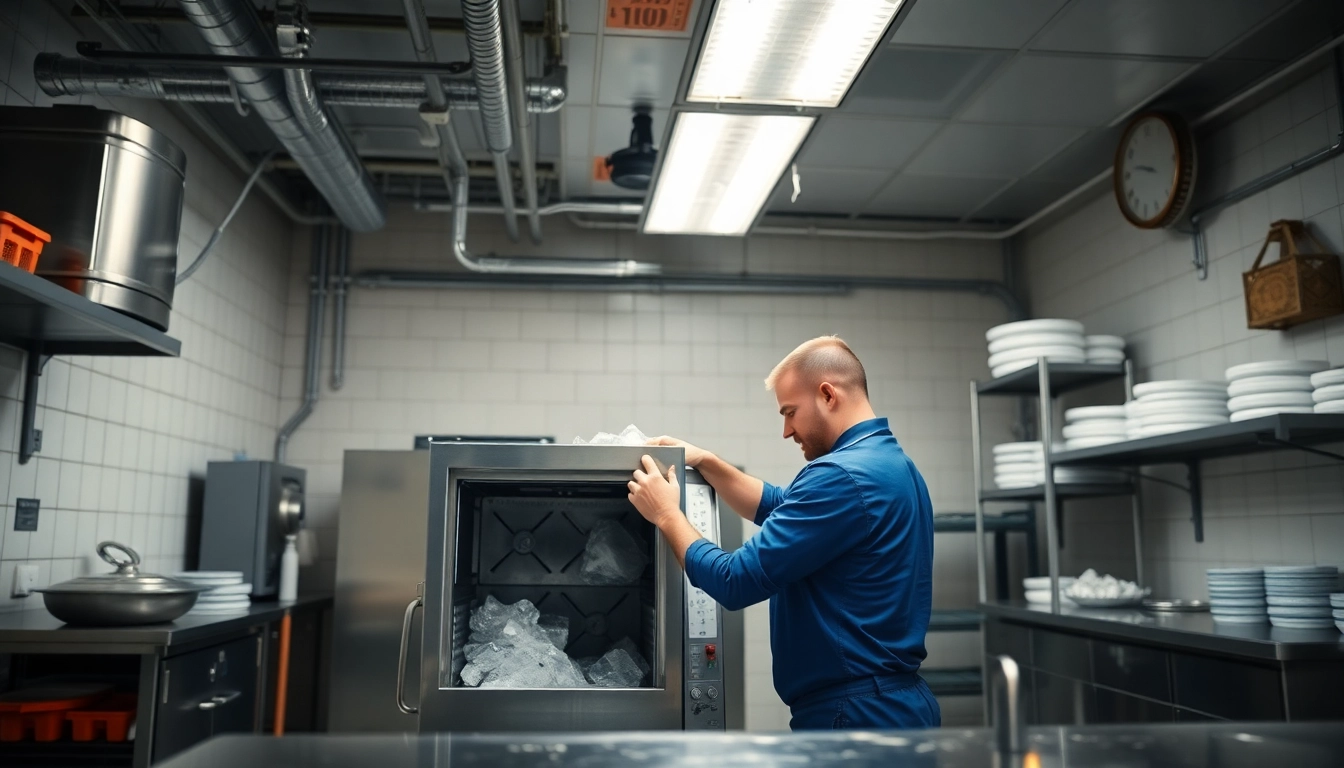Understanding Ice Machine Repair
Ice machines play a crucial role in both residential and commercial settings, providing a steady supply of ice for beverages and food preservation. However, like any appliance, they can encounter problems that necessitate repair. Understanding ice machine repair is essential for anyone who relies on these machines. This article will explore common issues, signs that repair is needed, and the benefits of engaging professional services.
Common Issues Faced by Ice Machines
Ice machines can experience a variety of issues that disrupt their function. Some of the most common problems include:
- Inadequate Ice Production: This is one of the most frequent complaints. It can stem from issues such as clogged water filters, insufficient water supply, or even mechanical failures within the ice-making components.
- Ice Quality Problems: Poor quality ice—such as cloudy or off-flavored ice—can arise from stagnant water, unclean machinery, or the presence of bacteria.
- No Ice Production: When the machine fails to produce any ice at all, it might be due to a malfunctioning thermostat, broken compressor, or electrical issues.
- Leaking Water: Water pooling around the machine can indicate a faulty drain line, pump issues, or degraded gaskets.
- Excessive Noise or Vibration: Unusual sounds can point to mechanical issues, such as worn bearings or misalignment of components.
Signs Your Ice Machine Needs Repair
Recognizing the signs that your ice machine needs repair can save you time and money. Watch for these indicators:
- Ice Production Decrease: If you notice significantly less ice being produced than usual, it may signal underlying problems.
- Unusual Odors or Tastes: A noticeable change in the smell or taste of your ice can indicate contamination, often caused by dirty components.
- Frequent Cycle Interruptions: If the ice-making cycle is longer than normal or stops unexpectedly, a repair may be necessary.
- Visible Damage: Check for cracks, rust, or other signs of wear and tear that might affect performance.
- Water Leakage: Puddles or leaks around the machine warrant immediate inspection to avoid further damage.
Benefits of Professional Repair Services
Engaging a professional repair service can bring numerous advantages, such as:
- Expert Diagnoses: Trained technicians can quickly pinpoint problems and offer solutions, preventing unnecessary delays and additional costs.
- Quality Repairs: Professionals use high-quality parts and adhere to industry standards, ensuring that repairs are lasting and reliable.
- Time Efficiency: Professional services are typically faster due to their experience and access to the right tools, minimizing downtime.
- Safety Considerations: Repairing ice machines may involve dealing with high voltages or refrigerant—the knowledge of professionals ensures that safety protocols are followed.
- Preventative Maintenance Advice: Professionals can provide valuable tips for keeping your ice machine in good condition long after the repair.
Do-It-Yourself Ice Machine Troubleshooting
While professional help is invaluable, understanding basic troubleshooting techniques can empower you as a user. Whether you’re facing minor issues or simply want to ensure your machine is running smoothly, here’s a guide on how to troubleshoot your ice machine effectively.
Basic Troubleshooting Steps
When encountering issues with your ice machine, consider the following troubleshooting steps:
- Check the Power Supply: Ensure the machine is plugged in and that the outlet is functioning correctly. A blown fuse or tripped circuit breaker could be the culprit.
- Inspect Water Supply: Verify that the water line is connected, and there are no kinks or blockages preventing water flow. Also, ensure the water valve is open.
- Clean Filters: Clogged or dirty water filters can reduce efficiency. Remove and clean or replace the filters as necessary.
- Look for Ice Buildup: Ice machines can freeze over their components, impacting function. Manually defrost the machine if necessary.
- Examine Settings: Ensure that the thermostat is set to the appropriate temperature for optimal ice production.
Ice Machine Components to Check
Knowing which components to check during troubleshooting can lead to quicker resolutions. Focus on:
- Water Inlet Valve: If this valve fails, water won’t fill the reservoir, leading to no ice production.
- Compressor: Responsible for cooling, a malfunctioning compressor won’t produce ice correctly.
- Thermostat: A faulty thermostat can either cause overcooling or undercooling, affecting ice quality and production.
- Ice Maker Assembly: Inspect the ice mold and harvest arm for blockages or damage that could hinder ice production.
- Drain Line: Ensure it is not clogged or obstructed to promote proper drainage after ice-making cycles.
When to Call a Professional for Ice Machine Repair
While some troubleshooting can be DIY, other situations warrant professional assistance:
- Complex Mechanical Issues: If problems persist despite basic troubleshooting, or if you’re dealing with mechanical failures, professional repair is necessary.
- Refrigerant Leaks: Handling refrigerants requires specialized knowledge—don’t attempt this on your own.
- Wiring Problems: If you suspect electrical issues, it’s best to leave them to trained technicians to avoid safety hazards.
- Repeated Breakdowns: If you find yourself frequently needing repairs, a professional can help assess the overall health and longevity of your machine.
Choosing the Right Ice Machine Repair Service
When your ice machine requires professional repair, selecting the right service is paramount for effective results. Here’s what to consider when choosing the right repair service.
What to Look for in a Repair Technician
Identifying qualified repair technicians can enhance your confidence in the care your ice machine receives. Look for:
- Certification and Licensing: Ensure that the technician is certified and licensed to perform repairs in your locality.
- Experience: Technicians with substantial experience dealing with ice machines will likely have encountered various issues and can offer tailored solutions.
- Customer Reviews: Reading user reviews and testimonials can provide insight into the technician’s service quality, reliability, and customer satisfaction.
- Insurance Coverage: Verify that the technician has insurance to cover potential damages or accidents during the repair process.
Top-Rated Ice Machine Repair Services in Your Area
Researching local repair services can lead you to high-quality professionals. Some top-rated options to consider might be:
- ABV Appliance and HVAC Services: Known for prompt, reliable repair services with a significant number of positive customer reviews.
- Dan’s Service: Offers both residential and commercial ice machine repair, with specialties in troubleshooting common ice machine problems.
- 24 Hour Refrigeration: Known for their quick response times and experienced technicians, catering to various ice machine brands and models.
- Mr. Appliance: A national chain with a reputation for quality service and extensive expertise in appliance repair, including ice machines.
Questions to Ask Before Hiring
Before you hire a technician, consider asking the following questions to gauge their suitability:
- What are your service rates, and do you offer estimates?
- Do you provide a warranty on repairs and parts?
- How long will the repair take?
- What brands and models do you specialize in?
- Can you provide references from previous customers?
The Costs of Ice Machine Repair
Understanding the costs associated with ice machine repair can help you budget effectively and set realistic expectations. Below are insights into average costs, factors influencing repairs, and budgeting tips.
Average Repair Costs and Factors Affecting Prices
The cost of repairing an ice machine generally falls within a range, influenced by several factors:
- Installation of Parts: New part installations generally vary depending on the brand and specific components being replaced. Basic parts may cost between $20 and $100, while specialized parts can go much higher.
- Labor Charges: Typically, labor is charged per hour, ranging from $50 to $125. Complex repairs may require more time and therefore higher costs.
- Diagnostic Fees: Many repair services charge a diagnostic fee that could be around $70 to $130; this often covers the first hour of labor.
- Extent of Repair: Minor issues will be less expensive to repair, while significant mechanical failures could elevate your cost to $500 or more.
Insurance and Warranty Considerations
It’s vital to consider whether your ice machine is covered under warranty or by your homeowner’s insurance. Here’s what to keep in mind:
- Manufacturer’s Warranty: If covered, reach out to the manufacturer to understand what repairs might be free or discounted.
- Homeowner’s Insurance: Check your policy as it may cover appliance repairs, although deductibles and coverage limits may apply.
- Service Contracts: Some services offer extended warranties or service contracts that can offset costs in the future.
Budgeting for Future Repairs
Preparing for unexpected repairs can save you stress and financial strain. Consider setting aside a specific savings amount each month to cover potential appliance costs. Assess the age of your ice machine, as older models may require more frequent maintenance and repairs.
Preventative Maintenance for Ice Machines
Preventative maintenance is key to extending the lifespan and efficiency of your ice machine. Following a structured maintenance routine can mitigate the likelihood of repairs needed in the future.
Regular Cleaning and Maintenance Tips
Establish a maintenance routine that includes:
- Regular Cleaning: Clean the ice machine at least quarterly to prevent mold and mineral buildup.
- Changing Water Filters: Change filters every six months or according to the manufacturer’s guidelines to ensure optimal water quality.
- Checking Water Supply Lines: Periodically examine the water lines for kinks, leaks, or wear.
- Scheduled Professional Maintenance: Engage professionals for annual check-ups to preemptively catch issues before they escalate.
Common Mistakes to Avoid
Avoid these pitfalls to keep your ice machine functioning optimally:
- Neglecting Cleaning: Failing to clean regularly can cause the machine to malfunction due to build-up.
- Using Unfiltered Water: Tap water can introduce minerals that affect efficiency and ice quality; always use filtered water if possible.
- Ignoring Symptoms: Address minor issues promptly before they become larger, costlier problems.
- Forgetting Component Checks: Regularly inspect components for wear and replace them as necessary, rather than waiting for failure.
Creating a Maintenance Schedule for Longevity
Developing a systematic maintenance schedule will help ensure your ice machine remains in good condition. Here is a sample plan:
- Daily: Check for ice production quantity and quality.
- Weekly: Inspect the exterior for cleanliness and check for leaks.
- Monthly: Clean air filters and check water supply connections.
- Quarterly: Deep clean the entire unit, including de-scaling if needed.
- Annually: Schedule professional maintenance to assess overall performance and make necessary adjustments.



